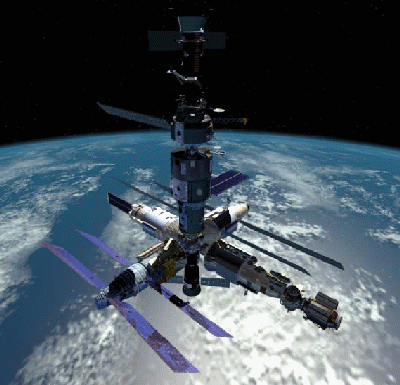 Energy
cost of transportation: virtually zero
Energy
cost of transportation: virtually zero
 Everything
can be customized
Everything
can be customized
-
gravity (by rotation)
climate
length of day
ecosystem
 Most important: surface-to-volume ratio
Most important: surface-to-volume ratio
A planet's raw material would give millions of times more living area
(We would use asteroids)
18.2 Constructing islands in space
 Precursors:
Precursors:
-
Skylab

Salyut

Mir

ISS (International Space Station)

 Raw Material - cannot be lifted from Earth
Raw Material - cannot be lifted from Earth
-
Use Asteroids - metal rich
 Use cylindrical geometry simulate
gravity
Use cylindrical geometry simulate
gravity
-
Apparently necessary for long-term health
 Mirrors - sunlight
& climate control
Mirrors - sunlight
& climate control

 Economic
independence is a must
Economic
independence is a must
 Near Earth,
could collect Solar energy & sell it to Earth
Near Earth,
could collect Solar energy & sell it to Earth

 Other space-based
industries
Other space-based
industries
 They can
(and have to) grow their own food.
They can
(and have to) grow their own food.
18.3 Life in space colonies
 Unprecedented social diversity possible
Unprecedented social diversity possible
- A habitat for each social group... (?)
 Enough space in the Solar System
Enough space in the Solar System
-
If Earth orbit becomes too crowded ...
 Political independence seems inevitable
Political independence seems inevitable
-
Increasing distances & self sufficiency
 Almost a utopia
Almost a utopia
-
No environmental pollution
No overcrowding
No pests
Perfectly controlled climate
Too good to be true?
References:
-
-
The High Frontier: Human Colonies In Space [book] by
Gerard O'Neill
- This book explains clearly and in great detail how habitats
in Earth orbit may be constructed, how life in such an habitat may be,
etc..
Suggested reading:
-
Rendezvous with Rama [book] by Arthur C.Clarke
- In this science-fiction novel, a spaceship in the form
of a cylinder with 50 km length and 20 km diameter comes into the Solar
System...
Previous: Using Space - now | Topic
List | Next: Space Travel


Bottom of
a (gravitational) well
Length of
day imposed
Atmosphere
imposed
Everything
can be customized
Precursors:




Economic
independence is a must
Near Earth,
could collect Solar energy & sell it to Earth
They can
(and have to) grow their own food.
Unprecedented social diversity possible
Enough space in the Solar System
Almost a utopia